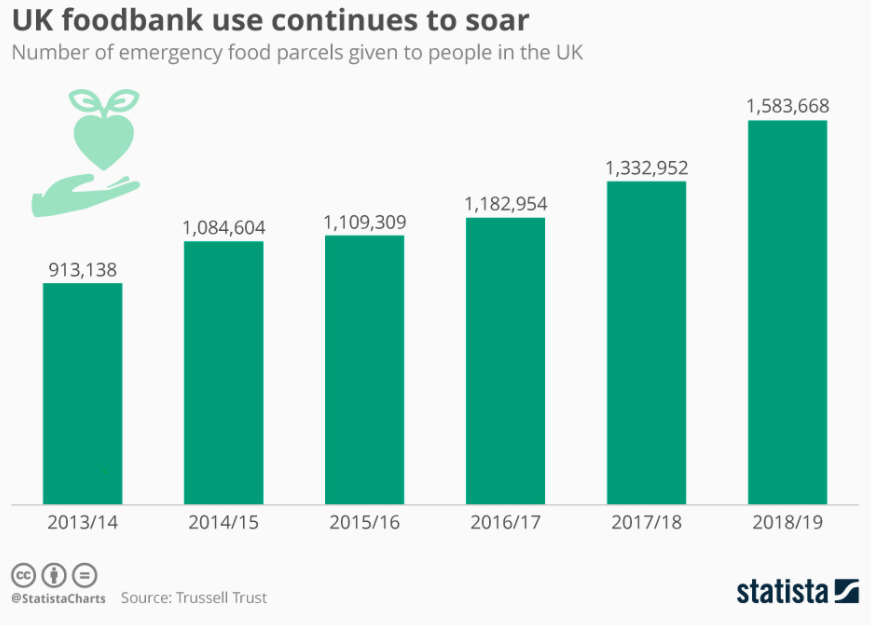First he tackled the government, now this UK footballer is trying to end child food poverty

Manchester United's Marcus Rashford has created a task force to tackle child food poverty.
Image: REUTERS
Stay up to date:
United Kingdom
- 2.4 million UK children live in homes where there isn’t always enough food.
- Footballer Marcus Rashford has already forced government policy change.
- Now he is teaming up with charities and food companies.
Not content with forcing a government U-turn on free school meals, footballer Marcus Rashford is continuing to tackle the problem of child food poverty in the UK.
Despite being one of the wealthiest countries in the world, the UK has more than 14 million people living below the poverty line – and of those, 4.6 million are children. The number of people who rely on foodbanks to feed themselves and their families is also on the increase.
The Manchester United and England striker has now formed a task force with some of the biggest UK retailers – including Tesco, Waitrose and Aldi – as well as charities helping those struggling to get enough to eat.

The Child Food Poverty Task Force was announced on Rashford’s Twitter account. It has three policy aims:
- Extending the eligibility criteria for free schools meals, to include an extra 1.5 million children.
- Making free food and free activities more widely available during school vacation periods.
- Increasing the value of meal vouchers, and making them available to more people.
Accept our marketing cookies to access this content.
These cookies are currently disabled in your browser.
U-turn on free school meals
Back in June, he led the call for an extension of a government free lunch scheme for school-aged children. Free school meals are available to children from low-income or single-parent families. But the scheme was due to be closed during the long summer school vacation period. Until Rashford stepped in and forced the government to rethink its plans.
Rashford said he knew almost immediately that the short-term win needed to be followed up by a coordinated plan of attack. “We had to think about the best way to do it, to think about how these families can eat long-term and not have any issues,” he said.
Accept our marketing cookies to access this content.
These cookies are currently disabled in your browser.
Research conducted on behalf of the charity Food Foundation concluded that during the COVID-19 lockdown there were around 2.4 million UK children living in households where there wasn’t always enough to eat. It also found that more than 200,000 children had to skip meals because their family couldn’t access sufficient food since the start of lockdown.
Malnutrition – a global problem
The consequences of food insecurity can be especially dire for children, according to a report from UNICEF, The State of the World’s Children 2019. It says “poor brain development, weak learning, low immunity, increased infections and, in many cases, death” are among the risks facing children who are not being properly fed.
Globally, around one-third of children under the age of five are either undernourished or overweight, the report says. That’s a total of approximately 200 million children.
In addition:
- 340 million children lack essential nutrients, including vitamin A and iron.
- 149 million children are too short for their age.
- 50 million children are too thin for their height.
- 40 million children are overweight or obese.
By bringing together voices from charities and experts from the food industry, Rashford says he hopes to be able to make a bigger difference. “We wanted to do it the best way we could, introduce the best people into our group, and see if using them [we] can push it even more,” he told the BBC. He has talked openly about his own childhood circumstances, and how important a voucher-based food support programme had been to his family.
Aged just 22, Marcus Rashford made his debut for Manchester United in the 2015/16 season and has played 214 games for the club, scoring 67 goals. He grew up in Manchester and describes himself as a life-long United fan. He has also played 38 times for England, scoring 10 goals.
Accept our marketing cookies to access this content.
These cookies are currently disabled in your browser.
Accept our marketing cookies to access this content.
These cookies are currently disabled in your browser.
Accept our marketing cookies to access this content.
These cookies are currently disabled in your browser.
Don't miss any update on this topic
Create a free account and access your personalized content collection with our latest publications and analyses.
License and Republishing
World Economic Forum articles may be republished in accordance with the Creative Commons Attribution-NonCommercial-NoDerivatives 4.0 International Public License, and in accordance with our Terms of Use.
The views expressed in this article are those of the author alone and not the World Economic Forum.
Forum Stories newsletter
Bringing you weekly curated insights and analysis on the global issues that matter.
More on Forum InstitutionalSee all
World Economic Forum
May 16, 2025
Victoria Masterson, Stephen Hall and Madeleine North
March 25, 2025
Lorez Qehaja
March 19, 2025





